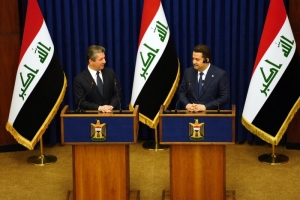Baghdad and Erbil agreement to resume oil exports through Türkiye
Baghdad and Erbil agreement to resume oil exports through Türkiye
4-4-2023
 BAGHDAD – Iraqi Prime Minister Muhammad Shia al-Sudani signed, on Tuesday, an agreement with the President of the Kurdistan Regional Government in the north of the country, Masrour Barzani, to resume oil exports via Turkey after it was suspended a few days ago due to a crisis between the two sides, stressing that it is temporary until Parliament approves the budget.
BAGHDAD – Iraqi Prime Minister Muhammad Shia al-Sudani signed, on Tuesday, an agreement with the President of the Kurdistan Regional Government in the north of the country, Masrour Barzani, to resume oil exports via Turkey after it was suspended a few days ago due to a crisis between the two sides, stressing that it is temporary until Parliament approves the budget.
This comes after Al-Sudani received, today, Tuesday, Masrour Barzani, President of the Kurdistan Regional Government, with the aim of holding talks to settle a dispute that has been going on for nearly twenty years regarding oil and gas.
Al-Sudani said during a joint press conference with Masrour Barzani, “Any delay regarding the non-resumption of oil exports will clearly affect the budget, and therefore the deficit rate will rise,” explaining that stopping Kurdistan’s oil exports “has great harm to all Iraqis, and this agreement will reduce those concerns.” .
He added, “This is a wealth for all the Iraqi people, and we must remove all obstacles in order for exports to resume,” stressing that “everyone must abide by the agreement and implement it.”
The agreement between the two sides means the resumption of oil exports from the Kurdistan region to the Turkish port of Ceyhan, after it was suspended last week, against the backdrop of a court ruling from the Paris Court in favor of the Iraqi Federal Ministry of Oil.
Al-Sudani explained that “this agreement is temporary until the arrival of the budget law, after it has been legislated by the House of Representatives.”
He pointed out that “the budget law is clear and addresses all the problems between Erbil and Baghdad,” noting that “there is a political agreement that was voted on by the House of Representatives, and we put within this agreement the texts that deal with that file.”
He stressed that “the budget law will include a fair distribution of wealth to all of Iraq,” pointing out that “there are committees that follow up on the articles contained in the terms of the agreement.”
Turkey stopped the flow of about 450,000 barrels per day of Iraqi crude through a pipeline from the border area of Fish Khabour to the Turkish port of Ceyhan on March 25, after Iraq won an arbitration case.
The interrupted flows represent only about 0.5 percent of global oil supplies, but this stoppage has forced oil companies operating in the region to halt production or transfer it to storage tanks that fill quickly, and also contributed to a rise in oil prices last week to nearly $80 a barrel.
Baghdad said in the lawsuit that Turkey violated a joint agreement by allowing the regional government to export oil to the port of Ceyhan without its consent.
Two Iraqi government officials told Reuters that under the agreement reached late Monday, the state-owned Iraqi Oil Marketing Company (SOMO) will be responsible for marketing and exporting KRG oil, and the proceeds will be deposited in an account in the Central Bank of Iraq run by the KRG. Kurdistan.
The two officials spoke on condition of anonymity because they were not authorized to speak to the media.
Baghdad will have the right to review this account.
Crude oil sales in the Kurdistan region through the pipeline with Turkey have witnessed a rapid increase over the past ten years, and their total value reached $12.3 billion in 2022, according to a Deloitte professional services report, up 62 percent from 2017 when the company first published its data. Once.
Trade sources said that the Kurdistan region, after suspending its oil exports, decided to stop paying six billion dollars worth of deals to ship crude oil to a number of energy companies, including Vitol and Petraco.
Observers say that the separatist motives fueled by the authority of President Massoud Barzani over the years after 2014 were the source of all troubles and conflicts between the regional government and the central government. These conflicts intensified when the forces affiliated with the region seized the oil fields in Kirkuk, and began exporting oil from them, given that this province falls within the “disputed areas” between the center and the region, despite the historical pluralistic nature of the population of this province, which combines Turkmens and Arabs. And the Kurds.
Despite the collapse of the separatist project in 2017, the decision of the Paris Court, which Iraq won in the conflict with Turkey, drove the final nail in the coffin of that project, and paved the way for a more balanced relationship between the center and the periphery in a federal state.
rawabetcenter.com
